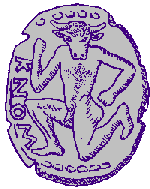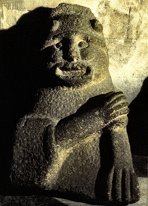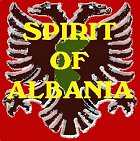
To
read this page properly, please ensure that the character encoding
of your browser is not set to the default 'Unicode'.
|
ALBANIAN
DIRT:
The difficulty of translating poetry is twofold: the words and meaning on the one hand, the flow and rhythm (or rhyme) on the other. Most translations of poetry are bad. This is mainly because the translator knows the foreign language too well and his or her language too poorly. In Albanian poetry, a good example of a classically-bad translator is Dr Robert Elsie, a Canadian albanologist of high distinction and erudition, but someone whose grasp of English is limited to the writing of tergid academic papers and dissertations. His translations read as if they were written by a student - or an Albanian - and, in their awkward, unconvincing, almost robotic English, do a disservice to the originals. In fact, after reading his (non-bilingual) anthology AN ELUSIVE EAGLE SOARS some years ago, I concluded that, unlike Macedonia, Albania had surprisingly poor poets - and started to write Albanian poems myself! It was then I realised that however good an original might be, it can be completely swamped or undermined by poor translation. Dr Elsie is not a poet - but that is irrelevant: some famous poets are extremely bad translators, the most obvious case being Robert "Iron John" Bly whose translations of Rilke are embarrassing. "Famous Séamus" Heaney and his fellow-Ulsterman Paul Muldoon are not much better. On the other hand, another Ulsterman, Ciaran Carson, is a superb translator - one of the very best, as can be seen in his rollicking and faithful translation from the Irish of the 18th century satire 'The Midnight Court'. I have said that the important thing to remember as a translator is that you need to be more thann just competent in the language you are translating into. Marcel Proust spoke almost no English, yet made excellent and accurate translations of John Ruskin into French. Good translators do not even need to speak either language natively as a 'mother-tongue' : an excellent example is Ewald Osers, a Czech who has made good translations of (Slavonic) Contemporary Macedonian Poetry (Forest Books), and of his fellow-countryman Miroslav Holub, into English. Admittedly, however, Holub (like Popa) translates gratefully. Another outstanding modern translator is Herbert Lomas (Bloodaxe Books) who has translated Contemporary Finnish Poetry. Neither of these books is in a bilingual edition - so it is impossible for me to say if the original is much better. But one which is - THE ERROR OF BEING by the outstanding Romanian poet Ion Caraion - can be seen to be poorly translated by Marguerite Dorian & Elliott B. Urdang without any knowledge by the reader of Romanian other than through other Romance languages and Latin. (See my own translation from this collection.) A GOOD POETRY-TRANSLATION IS ONE THAT HAS AN EXISTENCE INDEPENDENT OF THE ORIGINAL. The form of a poem is more important than the meaning(s). The most famously good translator is Edward FitzGerald, whose universally-known rendering of The Ruba'iyát of Omar Khayyám reads as if it were originally composed in English. In fact he re-wrote and re-ordered a selection of Khayyám's verses, and sacrificed the original (rather obscure) meaning to fluency, thus creating not just a new poem in its own right, but an uniquely visionary poem of genius. Even more extreme a translation is Yeats' early poem When you are old and grey and full of sleep... "translated" (or rather very freely paraphrased) from the incomparable Pierre de Ronsard's sonnet Quand vous serez vien vieille... of which only one line is actually translated from Ronsard's original. (Click to see Ronsard's original, my own translation, and Yeats' paraphrase all together.)
The contemporary and egregious Albanian poet Luljeta Lleshanaku has a whole posse of translators and her American editor Henry Israeli. But there are many examples of awkwardnesses and poor English in their translations; I think I have made a slightly better job of translating her splendid poem Provim. Many Albanian poems sent to me by my co-translator Zana Banci simply will not go into English. What sounds fresh in Albanian sounds banal in English, and there is no way to be faithful to the spirit of the original without traducing it at the same time: traduttore, traditore, as the famous Italian dictum has it. Albanian, like Serbian, is not a laconic language. English now is. When one is encounters zappy, laconic poetry in Albanian or Serbian, it is very difficult to render it in English - especially if there is word-play. On the other hand, it is equally difficult to translate more wordy Albanian poems without reducing them considerably. An example is a marvellous poem by Mitrush Kuteli, whose real name was Dhimitër Pasko, born in Pogradec, south-eastern Albania, in 1907, translated Gogol's Dead Souls into Albanian - and so was himself no stranger to the problems of translation. He was (like everyone of talent) sent to a labour-camp by Enver Hoxha, but escaped execution, because good translators were needed by the régime. Here is our translation of his fine, zappy poem:
by Dhimitër Pasko
(Mitrush Kuteli) I love you, Albanian
dirt. Up to my knees I love you, Albanian
dirt,
1. Mud, soil, earth, dirt. So here is a poem whose pivotal word cannot properly be translated into English. It can mean 'mud' or 'muddle' or 'mire' or 'motherland'. Yet it is such a light, witty and deep poem that it would be a shame not to unearth it for English readers. This is not the
only problem with this poem. In the very first line is another
ambiguous word, DUA which means not just 'love' and 'like',
but also 'need' and 'want'. Here is the Albanian
text.
Të
dua, baltë shqiptare!
Se gjer mbi gju Të
dua, baltë shqiptare
O such a surprise
A poem he wrote to his wife
from the horror of the prison camp: Të lutem mos më prit Na ndajnë terre rreth e qark Dhe yll për mua s'ndrit. Përse
ta lidhësh fatin tënd Pra
hidhe hapin guximtar
|
|
Some
translations, however, come relatively easily - like this one,
Pierre de
Ronsard (1524-1585)
When you are very old, at evening,
by the fire, Then not one of your servants
dozing gently there I'll be underneath the ground,
and a boneless shade regretting my love, and regretting
your disdain. (originally published in Tide and Undertow by Anthony Weir, Belfast 1975)
"Quand vous serez bien vieille..." Quand vous serez bien vieille,
au soir, à la chandelle, Lors, vous n'aurez servante
oyant telle nouvelle, Je seray sous la terre et fantaume
sans os : Regrettant mon amour et vostre
fier desdain.
When You are Old When you are old and grey and
full of sleep, How many loved your moments
of glad grace And bending down beside the
glowing bars,
|
>> Six translations of a poem by Rilke >>
Jewels
and Shit:
poems
by Arthur Rimbaud >>
Villon's Dialogue with his Heart >>
translations of poems by Hans Magnus Enzensberger >>
translation of Pushkin's famous 'Bronze Horseman' >>



